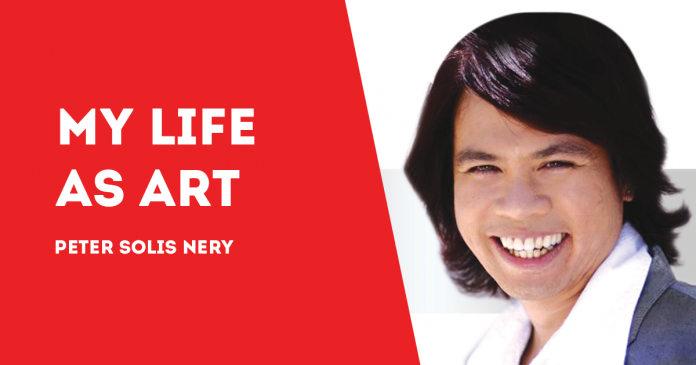
I DO NOT know that I like my created characters psychoanalyzed by readers. But I intentionally imbue my literary creations with complex psychology. Just in case some readers, like Breen Dote below, will analyze them someday. I cannot defend all the characters of my stories, but it’s rather nice to hear what readers think of them, too.
*
Breen Baroa Dote is with DepEd South Cotabato. He teaches Philippine Politics and Governance for senior high school, and English for Grade 10 at Surallah National High School in Surallah, South Cotabato.
*
Padre Olan on the Couch
A psychoanalysis of a fictional character
by Breen Baroa Dote
*
“Father Olan, God, and the Rain” in the original Hiligaynon version, “Si Padre Olan kag ang Dios”, won the sixth Palanca gold for Hall of Famer Peter Solis Nery in 2013. Since then, it has captured the heart of readers from all the different walks of life.
I have read the story five times not because I can barely understand it, but because it has so much to offer that I wanted to go back to it again and again. Despite its simple straightforward telling, it was truly rich and multilayered, and using only a colorful thread of language to weave a real masterpiece.
Every time I read it, the story creates a time machine that allows me to go back to the time where there is so much to celebrate about life and faith. How PSN (that’s Peter Solis Nery to you) described the setting is extraordinarily detailed. How he wove the ideas in showing the provincial place and the sweltering time of the drought was amazingly beautiful. The plot lets you travel to the perfect world of a reimagined reality where you could not even notice that you are smiling while reading it. Especially as it touches the inner preferences of your heart, as you easily relate and identify yourself to every character in PSN’s recreated world.
As I read again and again, Padre Olan’s character got my attention as I also noticed a few things about his behavior in the story. I know it sounds like I’m doing a personality analysis of a fictional character. But allow me. How PSN gave Father Olan the exact words to say seems to reveal so much of a back story: about Father Olan’s life experiences, and a taste of education and sophistication. Such strategic use of dialogue really contributes to how the story was crafted so well.
As you read the story for the first time, perhaps you may say that Padre Olan is just a typical priest who tried to provoke Don Beato in the power play of church politics. But as you reread the story, you may notice that there is something hidden, something camouflaged, in the priest’s personality. I have two arguments about Padre Olan’s characteristics in the story that might help readers understand him more. My analysis is not meant to demean the author, or to try to show how the story is “bad”. If at all, my admiration for PSN reaches to high heavens. And I simply love this story so much that I am compelled to comment and make my evaluation of it.
So, let us expose and study Padre Olan’s character.
In the beginning paragraphs, when Don Beato asked him for a special day of prayer for the rain, Father Olan refused, not only because of his devotion to St. John the Baptist, but also because he thought that the don wanted to control the church and was just only thinking of his farming business and not really about his faith in God. I say, Padre Olan was driven by his suspicious and psychoanalytic attitude.
Padre Olan showed a Paranoid Personality Disorder. The cause of PDD is not yet known, but it likely involves a combination of biological and psychological factors. Padre Olan displayed its symptoms which are: 1) unable to see his role in the problem or conflicts, 2) belief that he is always right, 3) argumentative and tends to develop negative stereotypes of others, especially those from different culture or groups. Padre Olan may have early childhood experiences, including physical or emotional trauma, that played a role in the development of his PDD.
Even the succeeding paragraphs about his meeting with the Knights of Columbus, and the Catholic Women’s League, showed his suspicious attitude towards the proposal of the parishioners. He strongly believes that the church organizations and their members were all under the spell and influence of Don Beato.
In addition, I diagnose Padre Olan with atychiphobia—the irrational and persistent fear of failing. This is another mood disorder, a kind of anxiety disorder, wherein a person is afraid of taking a risk on something where he might fail in the end. In the story, one can spot Padre Olan manifesting this fear as he repeatedly asked “What if it does not rain?”, “What if we do everything the people want, and still it does not rain?”, “What if I get frustrated?”.
But I like how PSN presented Padre Olan’s character to his readers. The author subtly hinted that what we see is what we get, but we must always look at what’s inside our hearts. And what we will see is faith.
My analysis is not meant to show that Padre Olan is bad, or has a mental disorder. I am not a psychologist. I only want to suggest that all of us can be some sort of Padre Olan in our lives, as we feel different emotions that make us human. I do not pretend to be better than the author in characterizing Father Olan. On the contrary, I want to show how PSN’s prowess in creating compelling characters (in his realistic and beautiful stories) can drive readers like me to read what goes on the page and beyond./PN





